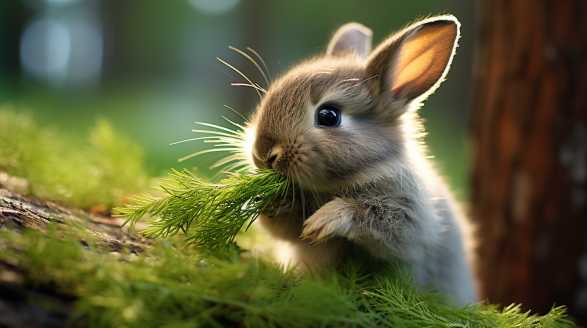Introduction
Can Rabbits Eat Dill? Let’s find out in this comprehensive guide about Rabbits and dill.
I did some digging and discovered that dill is not only a delightful culinary ingredient but also a powerhouse of nutrition for our beloved lagomorphs. I mean, who knew this feathery herb could benefit our rabbits in so many incredible ways?
From promoting digestion and boosting the immune system to supporting dental health and even potentially aiding in reproductive wellness, dill packs quite the punch! And the best part?
So, prepare your taste buds and get ready to embark on an aromatic adventure with your furry friends.
we’ll explore the ins and outs of dill for rabbits – from its nutritional benefits and potential risks to tips on introducing it into their diet and even some delicious dill-infused recipes. We’ll dive deep into the wonderful world of dill and uncover the secrets it holds for our furry companions.
So, get ready to discover the wonders of dill. Your bunnies will be hopping with joy when they get a taste of this herbaceous delight.
Get ready for some dill-icious discoveries, my fellow rabbit lovers!
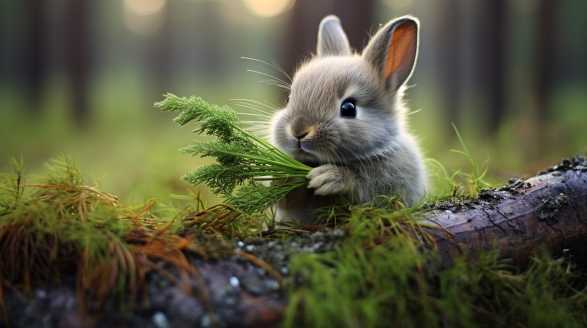
Key Takeaways
- Dill is safe for rabbits in moderation but should be introduced gradually to avoid digestive upset.
- Dill is rich in vitamins A, C, and K, as well as minerals like calcium, iron, and magnesium.
- Dill can promote digestion, boost the immune system, reduce inflammation, and support dental health in rabbits.
- Some rabbits may be allergic to dill, so it’s important to monitor for any signs of allergies.
- Wash dill thoroughly before feeding it to your rabbit and avoid overfeeding to prevent digestive issues.
- Dill can be served fresh, mixed in hay, or added to homemade pellets for variety in the rabbit’s diet.
- Consult a veterinarian before making any changes to your rabbit’s diet or if you have concerns about allergies or reactions to dill.
Dill: A Tasty Treat or Harmful Herb for Rabbits?
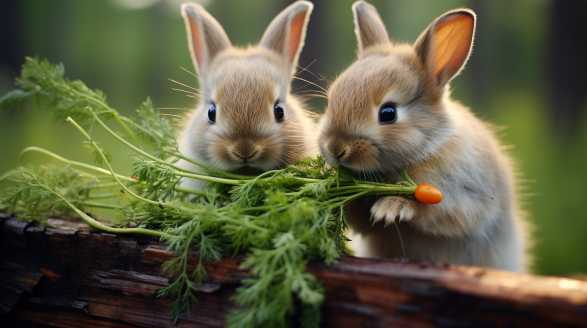
What is Dill?
Before we dive into the rabbit-specific details, let’s get to know dill a bit better. Dill, scientifically known as Anethum graveolens, is an annual herb that belongs to the celery family.
With its feathery leaves and delicate yellow flowers, dill adds a delightful touch to dishes and garnishes.
Nutritional Benefits of Dill
Dill is a nutrition powerhouse that offers various health benefits. It is rich in vitamins A, C, and K, as well as minerals like calcium, iron, and magnesium.
Additionally, dill contains flavonoids that possess anti-inflammatory properties.
Can Rabbits Eat Dill?
Now comes the moment of truth – can our furry friends munch on dill without any worries? The answer is YES, rabbits can eat dill!
However, keep in mind that rabbits have delicate digestive systems, so introducing any new food should be done gradually.
How Much Dill is Safe for Rabbits?
As we know, moderation is key, and dill is no exception. It is recommended to offer dill as an occasional treat rather than a staple in a rabbit’s diet.
This ensures your rabbit gets a taste of the herb without causing digestive upset.
Health Benefits of Dill for Rabbits
Including dill in your rabbit’s diet can bring a range of health benefits. Here are a few ways dill can positively impact your furry friend:
- Hydration: Dill has a high water content, which can contribute to keeping your rabbit well-hydrated.
- Improved digestion: Dill acts as a natural digestive aid, promoting proper digestion and reducing the risk of gastrointestinal issues.
- Anti-inflammatory properties: The presence of flavonoids in dill can help reduce inflammation in rabbits, relieving discomfort and improving overall well-being.
- Antioxidant boost: The antioxidants found in dill can support your rabbit’s immune system, protecting against oxidative stress.
Precautions and Potential Risks
While dill is generally safe for rabbits to consume, it is essential to consider a few precautions:
- Allergies: Some rabbits may be allergic to dill or certain components present in the herb. If you observe any signs of allergies such as itching, sneezing, or swelling, consult your vet immediately.
- Unwashed Dill: Always make sure to thoroughly wash dill before feeding it to your rabbit to remove any potential pesticides or contaminants.
- Overfeeding: As with any treat, offering dill in excess can lead to digestive upset. Remember to only offer dill in moderation to avoid any unwanted health issues.
How to Serve Dill to Your Rabbit
To ensure your rabbit safely enjoys the deliciousness of dill, follow these simple guidelines:
- Fresh First: Always use fresh dill as wilted or spoiled herbs can cause digestive problems in rabbits.
- Rinse Thoroughly: Wash the dill well with water to remove any dirt or chemicals that might harm your rabbit.
- Trim and Serve: Cut the dill into small, manageable pieces. Remove tough stems and any parts that could pose a choking hazard.
- Introduce Gradually: Start by feeding your rabbit a small amount of dill and gauge their reaction. If everything goes well, you can gradually increase the quantity.
Dill can indeed be a tasty treat for rabbits when offered in moderation. This aromatic herb not only adds flavor to dishes but also provides several health benefits for our furry friends.
With proper care, you can introduce dill to your rabbit’s diet and watch them enjoy a burst of flavor and nutrition. So, go ahead and treat your bunny to some dill – the perfect combination of taste and goodness!
Introducing Dill to Baby Rabbits: A Step-by-Step Approach
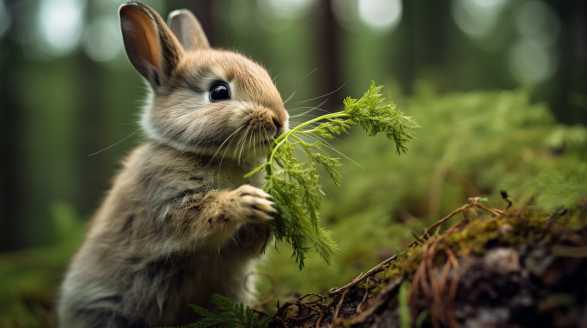
Why Choose Dill for Baby Rabbits?
Dill is not only delightful to our taste buds but also beneficial for our hopping companions. This herb is packed with essential vitamins, including A, C, and K, as well as minerals like calcium and iron.
When it comes to introducing any new food to your baby rabbits, it’s vital to take things slow and steady. This applies to dill as well.
Observe their reactions carefully.
Step 2: Monitor their Response
After introducing dill to your baby bunnies, it’s crucial to monitor how they react to this new herb. Keep an eye on their behavior, appetite, and digestive system.
Remember, each bunny is unique, so their response to dill may vary.
Signs of a Positive Response to Dill
- Increased curiosity towards the dill sprig.
- Eager nibbling and munching sounds.
- No signs of discomfort or digestive disturbances.
- Normal behavior and interaction with their surroundings.
Signs of a Negative Response to Dill
- Lack of interest in the dill sprig.
- Refusing to nibble or eat the dill.
- Digestive problems like diarrhea or constipation.
- Lethargy or changes in behavior.
Step 3: Gradually Increase the Quantity
Assuming your little fluff balls have shown positive signs upon their first encounter with dill, it’s time to increase the quantity gradually. Begin by introducing small amounts of dill in their meals, mixing it with their regular food.
Step 4: Be Mindful of Quantity and Frequency
As your baby rabbits begin to adapt to dill in their diet, it’s essential to maintain a healthy balance. While dill offers numerous benefits, it should be given as part of a varied menu rather than as a sole food source.
Too much dill can lead to an upset tummy. Aim for feeding dill alongside other greens on an occasional basis.
Step 5: Other Rabbit-Safe Herbs to Consider
While dill is an excellent herb to introduce to your baby rabbits, it’s always a good idea to offer a diverse range of safe herbs. Here are a few other options you can consider:
- Parsley: A popular choice among bunnies, packed with vitamins and minerals.
- Cilantro: Rich in antioxidants and a great source of vitamin C.
- Mint: Keeps your bunnies’ breath fresh and may even have some digestive benefits.
- Basil: Provides a natural source of magnesium and calcium.
So there you have it, my fellow rabbit lovers! Introducing dill to your baby rabbits doesn’t have to be a perplexing task.
Remember, a varied diet helps keep our furry friends happy and healthy. So go ahead, grab some dill, and watch those little noses twitch with excitement!
The Nutritional Benefits of Dill for Rabbits
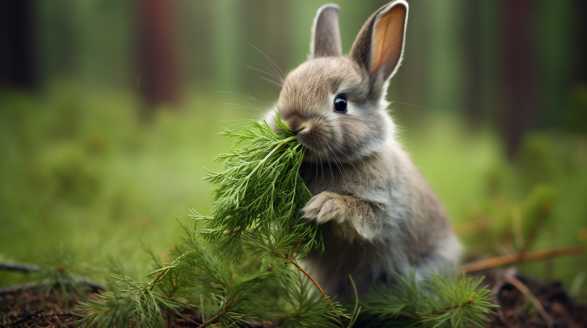
Diving into the World of Dill
Before we embark on this journey exploring the nutritional wonders of dill, let me give you a brief introduction to this marvelous herb. Dill, scientifically known as Anethum graveolens, is an annual herbaceous plant that belongs to the celery family.
A Nutritional Powerhouse for Your Bunny
Now let’s get into the nitty-gritty of why dill is such a beneficial addition to your rabbit’s diet. Here are some key nutrients found in dill that can work wonders for your furry friend:
- Vitamin C: Dill is an excellent source of vitamin C, which plays a crucial role in supporting your rabbit’s immune system and overall well-being. It helps protect the body against harmful free radicals and boosts collagen production, resulting in healthy skin and strong blood vessels.
- Vitamin A: This herb is also packed with vitamin A, promoting good vision and supporting your rabbit’s reproductive health. It helps maintain healthy skin, mucus membranes, and a strong immune system.
- Fiber: Fiber is a vital component of a rabbit’s diet, as it aids in proper digestion and prevents gastrointestinal issues. Dill contains a good amount of dietary fiber, ensuring your bunny’s digestive tract stays healthy and happy.
- Antioxidants: Dill is rich in antioxidants, such as flavonoids and polyphenols, which help combat oxidative stress and reduce the risk of chronic diseases in rabbits. These powerful compounds promote overall health and vitality.
Boosting Your Bunny’s Health with Dill
Now that we’ve covered the essential nutrients dill provides, let’s explore the remarkable health benefits it brings to our adorable lagomorph friends:
1. Improved Digestion
Dill contains ample amounts of dietary fiber, which aids in proper digestion for your rabbit. By consuming dill, your bunny’s digestive system will function smoothly and efficiently, preventing issues like diarrhea and constipation.
2. Enhanced Immune System
Thanks to its high vitamin C content, dill works wonders for your rabbit’s immune system. This herb helps boost your bunny’s defense against infections, preventing them from falling prey to common illnesses.
3. Promotes Eye Health
Vitamin A is essential for maintaining good eyesight and promoting optimal eye health in rabbits. By incorporating dill into your bunny’s diet, you can ensure their vision remains sharp and clear.
4. Supports Dental Health
Did you know that rabbits’ teeth grow continuously throughout their lives? Dental problems can arise if their teeth aren’t wearing down properly.
Introducing Dill to Your Bunny’s Diet
Now that you have a good understanding of the nutritional benefits of dill for rabbits, you might be eager to introduce it to your furry friend’s diet. Here are some tips to get you started safely:
- Gradual Introduction: When introducing any new food to your rabbit, it’s important to do it gradually. Start by offering small amounts of dill mixed with their usual vegetables or hay. Monitor their response and increase the amount slowly over time.
- Fresh and Organic: Always opt for fresh, organically grown dill to ensure it is free from harmful pesticides or chemicals. Your bunny deserves the best!
- Balanced Variety: Remember that while dill offers numerous benefits, it should be given as part of a balanced diet. Include a diverse range of vegetables, fresh hay, and limited pellets to meet all your rabbit’s nutritional needs.
Dill is not only a flavorful herb for humans but also an incredible addition to your rabbit’s diet. From enhancing digestion and boosting the immune system to promoting eye and dental health, the nutritional benefits of dill are truly remarkable.
Your bunny will surely appreciate the burst of flavors while reaping the fantastic health benefits that this wonderful herb has to offer.
Remember to consult your veterinarian before making any changes to your rabbit’s diet, as individual needs may vary. Let’s keep our fluffy companions healthy and happy together!
Note: This article is intended for informational purposes only and should not replace professional veterinary advice.
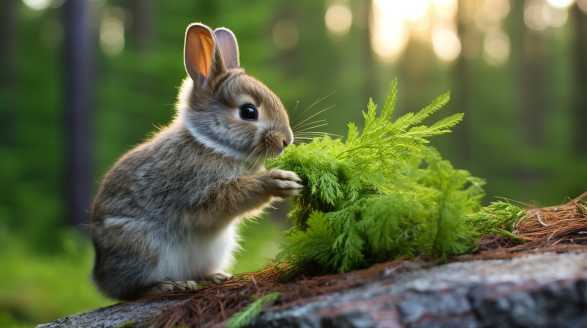
The Importance of Dill in a Balanced Rabbit Diet
A Burst of Flavor and Nutrients
Dill, scientifically known as Anethum graveolens, is a fragrant herb that originates from the Mediterranean region. Known for its distinct taste and aroma, dill not only adds a burst of flavor to dishes but also offers a range of essential nutrients that can benefit rabbits.
- Vitamin C: Dill is rich in Vitamin C, an antioxidant that boosts the immune system and improves overall health.
- Fiber: The presence of fiber aids in proper digestion and helps prevent gastrointestinal issues such as constipation.
- Minerals: Dill contains essential minerals like potassium, calcium, and iron, which are necessary for maintaining healthy bones and promoting red blood cell production.
- Antioxidants: Packed with flavonoids and carotenoids, dill has antioxidant properties that combat harmful free radicals and reduce the risk of chronic diseases.
A Natural Diuretic
A Happy and Hydrated Bunny
No one likes the feeling of bloating or water retention, including rabbits! That’s where dill comes in as a natural diuretic.
The diuretic properties of dill assist in flushing out toxins and prevent the formation of kidney stones or urinary tract issues. A hydrated bunny is a happy bunny, after all!
Promoting Dental Health
Chew on This!
Rabbits have continuously growing teeth, which can lead to dental problems if not properly addressed. One way to ensure your bunny’s dental health is by giving them adequate opportunities to chew.
The fibrous nature of dill helps wear down their teeth naturally while promoting good oral hygiene. So, not only will your rabbit enjoy the taste, but they will also be maintaining strong and healthy teeth!
The Fuss-Free Snack
A Dill-icious and Convenient Treat
You may be wondering how to incorporate dill into your rabbit’s diet without much hassle. The good news is that dill is incredibly versatile and can be fed to rabbits in various ways:
- Fresh Dill: Offer fresh dill leaves as a standalone snack. Rabbits usually love the crunch and flavor of dill.
- Mixed in Hay: Sprinkle dried dill over their hay or mix it in for some added excitement during mealtime.
- Herb Garden: Consider growing dill in your herb garden. This way, you can have a fresh and easily accessible supply of dill for your bunny.
How Much Dill is Too Much?
Moderation is Key
While dill is undoubtedly beneficial for rabbits, it’s important to remember that moderation is key. Like any other treat, dill should be given in appropriate quantities to avoid any potential digestive issues.
Always introduce new foods gradually and monitor your bunny’s response to ensure it agrees with their tummy.
Dill is a fantastic addition to a balanced rabbit diet, providing not only a burst of flavor but also essential nutrients, promoting urinary health, and supporting dental hygiene. By including dill in your bunny’s meal plan, you are not only contributing to their overall well-being but also adding an exciting and enjoyable element to their daily routine.
Dill: An Effective Herbal Remedy for Common Rabbit Digestive Issues
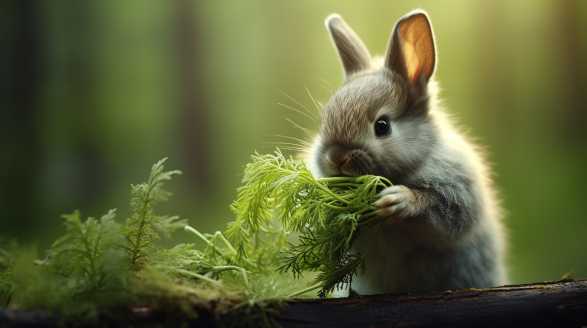
What is Dill?
Dill (Anethum graveolens) is a fragrant herb that belongs to the celery family. It is commonly used in cooking for its unique flavor and aroma.
The Digestive Wonders of Dill
Dill is known for its exceptional digestive properties. It contains essential oils, flavonoids, and other active compounds that can help alleviate common rabbit digestive issues.
- Relieves Gas: Gas buildup in a rabbit’s stomach can lead to discomfort and bloating. Dill’s carminative properties help eliminate excess gas and provide relief.
- Soothes Upset Stomach: If your rabbit experiences an upset stomach or indigestion, dill can help calm the digestive system and promote healthy digestion.
- Reduces Diarrhea: Diarrhea is a common problem among rabbits, and dill’s antispasmodic properties can help reduce spasms in the intestine, leading to firmer stools.
- Eases Constipation: On the other hand, if your rabbit suffers from constipation, dill’s natural fiber content can act as a gentle laxative and promote regular bowel movements.
- Anti-Inflammatory Effects: Inflammation in the digestive tract can cause discomfort and disrupt the normal functioning of the gut. Dill possesses anti-inflammatory properties that can help reduce inflammation and restore digestive balance.
How to Use Dill as an Herbal Remedy
Now that you know the incredible benefits of dill, let’s discuss how you can effectively use it to treat common rabbit digestive issues. Here are some simple and effective methods:
- Dill Tea: Brewing a cup of dill tea is a straightforward way to harness its medicinal properties. Here’s how you can make it:
- Boil a cup of water.
- Add a tablespoon of dried dill leaves or a fresh dill sprig.
- Allow it to steep for 10-15 minutes.
- Strain the tea and let it cool.
- Offer the cooled dill tea to your rabbit in a small dish.
- Adding Dill to Food: Incorporating dill into your rabbit’s daily diet is another excellent option. You can sprinkle dried dill leaves or finely chopped fresh dill over their regular food. Start with small amounts and observe your rabbit’s response.
Precautions and Considerations
When using dill as an herbal remedy for your rabbit’s digestive issues, it is crucial to keep these precautions in mind:
- Moderation: While dill has numerous benefits, it should be used in moderation. Excessive consumption may cause adverse effects.
- Quality and Sourcing: Ensure that you are using organic dill that is free from pesticides and other harmful chemicals. Sourcing dill from reputable suppliers is essential to avoid any potential contaminants.
- Consult Your Veterinarian: If your rabbit’s digestive issues persist or worsen, it is always recommended to consult a veterinarian. They can provide professional guidance and advice tailored to your rabbit’s specific needs.
Incorporating dill as a herbal remedy for common rabbit digestive issues can be a game-changer in promoting your rabbit’s overall health and well-being. Its natural properties can address issues such as gas, upset stomach, diarrhea, and constipation.
Your furry friend will surely thank you for it!
Remember to introduce any changes gradually and observe your rabbit’s response. If you have any concerns, don’t hesitate to consult your veterinarian.
Exploring the Potential Risks of Feeding Dill to Rabbits
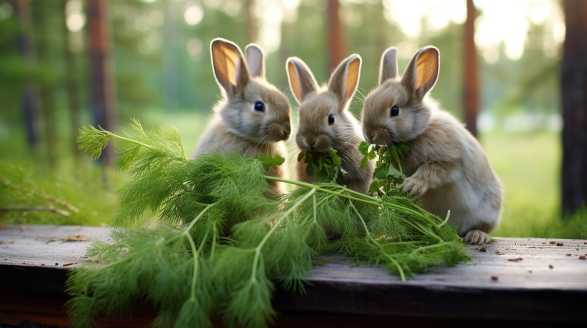
Introduction
Hello there, fellow rabbit enthusiasts! Today, I want to look into an intriguing topic that has left me scratching my head lately.
As devoted furry friend advocates, it is essential to understand what potential harm certain foods can pose to these delicate herbivores. From potential digestive woes to more serious health concerns, let’s embark on this enlightening journey together!
The Aromatic Herb: Dill
Before we dive headfirst into this topic, let’s get introduced to dill. This aromatic herb, known for its distinct flavor and pungent scent, is often used to liven up our culinary creations.
It’s time to explore dill’s potential impact on rabbits’ health.
Can Rabbits Safely Munch on Dill?
While dill may tickle our taste buds, it’s important to note that rabbits have unique dietary requirements. As strict herbivores, their digestive systems are finely tuned to handle a specific range of foods.
Let’s examine the potential risks:
1. Digestive Upset
Rabbits have delicate digestive systems that depend on a fine balance of nutrients. Feeding dill to your furry friend can disrupt this equilibrium, leading to digestive upset.
2. Toxicity Concerns
Believe it or not, certain plants contain compounds that can be toxic to rabbits, and dill happens to be one of them. While this herb is generally safe for humans, it has a potential for toxicity in rabbits due to its chemical composition.
3. Calcium, Vitamin C, and Nutritional Balance
Rabbits require specific levels of calcium and vitamin C to maintain optimal health. Unfortunately, dill does not offer these essential nutrients in sufficient quantities.
Now that we have thoroughly explored the potential risks of feeding dill to rabbits, it’s clear that caution should be exercised when it comes to introducing this herb into your bunny’s diet. While dill may seem like an innocent addition to our human meals, it is best to save it solely for our plates and avoid sharing it with our fluffy friends.
Remember, the health and well-being of our beloved rabbits should always be our top priority. Consult with a knowledgeable veterinarian to ensure your bunny’s diet provides all the necessary nutrients they need.
As always, until our next intriguing rabbit exploration, hop on with caution!
Disclaimer: This article is for informational purposes only and should not be considered as veterinary advice. Always consult with a qualified veterinarian before making any changes to your pet’s diet or health routine.
The Potential Impact of Dill on the Reproductive Health of Rabbits
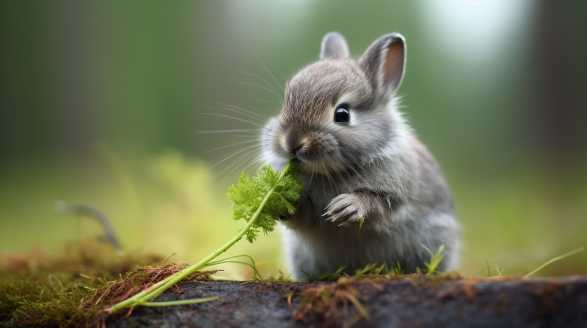
As a passionate rabbit owner, I have always been fascinated by the impact of different herbs and plants on the health and wellbeing of my furry friends. Recently, I came across an intriguing topic that piqued my curiosity – the potential impact of dill on the reproductive health of rabbits.
Getting to Know Dill
Before we dive into the potential impact on rabbit reproductive health, let’s first get acquainted with this delightful herb. Dill (Anethum graveolens) is an aromatic herb that belongs to the celery family.
Dill is incredibly versatile and can be used in various culinary dishes, such as soups, salads, and even pickles. Its feathery leaves and delicate yellow flowers add a touch of elegance to any dish.
Let’s find out!
The Benefits of Dill for Rabbits
1. Nutritional Value
Dill is not only a tasty herb but also a great source of essential vitamins and minerals that can benefit your rabbit. It contains vitamins A and C, which help support a healthy immune system.
2. Aiding Digestion
Rabbits are notorious for their sensitive digestive systems. Including dill in their diet can help alleviate digestive issues and promote healthy gut flora.
3. Antioxidant Properties
Dill possesses powerful antioxidant properties that can help fight off harmful free radicals in your rabbit’s body. These antioxidants play a crucial role in maintaining overall health and preventing oxidative stress, ultimately contributing to improved reproductive health.
Potential Risks and Precautions
While dill can offer numerous benefits for rabbits, it is crucial to consider potential risks and take necessary precautions before introducing it into their diet. Here are a few key points to keep in mind:
1. Moderation is Key
As with any new food, it is important to introduce dill gradually into your rabbit’s diet. Start with small amounts and closely monitor their response.
2. Organic and Pesticide-Free
When selecting dill for your rabbits, opt for organic and pesticide-free options. Pesticides and chemicals used in conventional farming can be harmful to your rabbit’s health.
How to Incorporate Dill into Your Rabbit’s Diet
1. Chopped Dill as a Tasty Treat
One simple way to introduce dill to your rabbit is by offering it as a delicious treat. Chop fresh dill into small pieces and offer it alongside their regular diet.
2. Blending Dill in Homemade Pellets
If you are eager to offer the benefits of dill in a more balanced manner, consider blending it into homemade rabbit pellets. Mix small amounts of finely chopped dill into the pellet mixture for a nutritious and flavorful twist.
3. Dill as a Stimulating Toy
Rabbits love nibbling and exploring new textures. Tie a small bunch of dill to their enclosure or place it inside a chew toy.
Incorporating dill into your rabbit’s diet can potentially have a positive impact on their reproductive health. From its nutritional value to aiding digestion and providing essential antioxidants, dill proves to be an exciting addition to their menu.
Always remember to consult your veterinarian before making any significant changes to your rabbit’s diet. They can provide valuable guidance tailored to your rabbit’s specific needs.
All You Need to Know About Dill Allergies in Rabbits
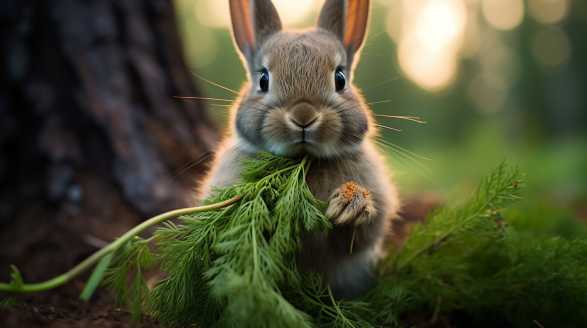
As a passionate rabbit owner, I have always made it my mission to provide the best care for my fluffy friends. However, when I discovered that dill, a seemingly harmless herb, could potentially cause allergies in rabbits, it left me feeling perplexed and concerned.
So, let’s dive right in!
What is Dill?
Dill (Anethum graveolens) is a versatile herb with feathery green leaves and delicate yellow flowers. Known for its unique flavor, dill is often used in various culinary dishes and herbal remedies due to its many health benefits.
The Dangers of Dill Allergies in Rabbits
Rabbits, like humans, can develop allergies to certain substances, and dill is no exception. While dill itself does not pose a significant risk to rabbits, some individuals may experience adverse reactions when exposed to this herb.
- ### Digestive Upset:
- Loss of appetite
- Diarrhea
- Vomiting
- ### Respiratory Problems:
- Sneezing
- Wheezing
- Difficulty breathing
- ### Skin Irritation:
- Itching
- Redness
- Rashes
Identifying Dill Allergies in Your Rabbit
If you suspect your rabbit may be allergic to dill, it’s crucial to monitor their behavior and physical symptoms. Look out for any unusual reactions after introducing dill into their diet or environment.
- Frequent scratching or grooming
- Runny nose or watery eyes
- Hunched posture or lethargy
- Loss of fur or skin lesions
Treatment and Prevention
If your rabbit exhibits any allergic symptoms, it’s important to consult a veterinarian for a proper diagnosis and treatment plan. While there is no specific cure for dill allergies, your vet may prescribe medications to alleviate their discomfort and manage the allergic response.
Prevention is key when it comes to dill allergies in rabbits. Here are some guidelines to follow:
- ## Limit Dill Intake:
- Avoid feeding your rabbit large amounts of dill or making it a staple in their diet.
- Monitor any reactions after introducing dill into their meals.
- ## Diversify Their Diet:
- Provide a balanced and diverse diet consisting of fresh hay, high-quality rabbit pellets, and a variety of vegetables and herbs.
- Avoid relying solely on any one ingredient.
- ## Herbal Alternatives:
- Substitute dill with other safe herbs, such as parsley, cilantro, or basil, to add flavor to your rabbit’s meals.
- Introduce new herbs gradually and monitor for any adverse reactions.
- ## Environmental Control:
- If you have dill growing around your rabbit’s environment, remove or relocate it to minimize the risk of exposure.
While rabbits are generally delicate creatures, dill allergies remain a relatively rare occurrence. By remaining observant and taking the necessary precautions, you can ensure the wellbeing of your rabbit and provide them with a safe and varied diet.
Remember, if you suspect any allergies or notice unusual behavior and symptoms in your rabbit, consulting a veterinarian is always the best course of action. By staying informed and acting with care, you can keep your bunny healthy, happy, and free from the complexities of dill allergies.
Incorporating Dill into Your Rabbit’s Diet: A Beginner’s Guide
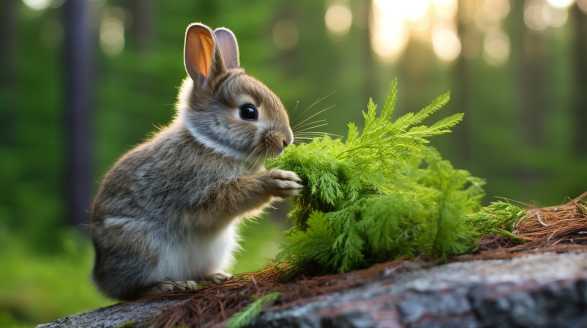
Hello fellow rabbit enthusiasts! If you are looking to enhance your beloved bunny’s diet with some delicious and nutritious herbs, then you have come to the right place.
Whether you are a beginner or an experienced rabbit owner, this guide will provide you with all the necessary information to introduce dill into your furry friend’s diet for a delightful and healthy twist. Let’s hop right in!
Why Dill?
Before we look into the details, let’s take a moment to appreciate the numerous benefits dill brings to your rabbit’s diet. Dill is not only packed with essential vitamins and minerals but also offers a unique taste and aroma that will undoubtedly excite your bunny’s taste buds.
Choosing and Preparing Fresh Dill
When incorporating dill into your rabbit’s diet, it is crucial to select fresh and high-quality herbs. Here’s a simple checklist to follow when choosing dill for your furry friend:
- Look for vibrant green leaves: Fresh dill should have lush, green leaves that are not wilted or discolored.
- Check for overall freshness: Avoid dill with a strong, unpleasant odor or any signs of sliminess.
- Opt for organic if possible: Organic dill ensures that your rabbit is not exposed to harmful pesticides or chemicals.
Once you have obtained your fresh dill, it is essential to prepare it properly before feeding it to your rabbit:
- Wash thoroughly: Rinse the dill under cold water, ensuring the removal of any dirt or contaminants.
- Pat dry: Gently pat the dill leaves dry with a clean towel or paper towels.
- Chop into appropriate portions: Cut the dill into small, rabbit-friendly pieces, removing any tough stems.
Quantity and Frequency
To maintain a balanced diet for your rabbit, it is necessary to understand the appropriate quantity and frequency of dill consumption. Here’s a handy guideline to follow:
- Quantity: As a general rule, limit dill intake to about a teaspoon per pound of a rabbit’s body weight per day. However, it is crucial to gradually introduce dill into your rabbit’s diet to prevent any digestive upsets.
- Frequency: Start by giving your bunny a small portion of dill a few times a week. Observe your rabbit’s reaction and adjust the frequency accordingly. Remember, moderation is key!
Incorporating Dill into Your Rabbit’s Diet: Ideas and Recipes
Now that we have covered the basics, let’s move on to some exciting ways to incorporate dill into your rabbit’s daily meals. Here are a few simple ideas and recipes to get you started:
1. Dill-Infused Hay Cubes
Transform your rabbit’s ordinary hay into a gourmet treat by infusing it with the refreshing aroma of dill. Here’s how:
- Take a handful of fresh dill leaves and sprinkle them evenly over a layer of hay in a cardboard box.
- Add another layer of hay on top and repeat the process until the box is full.
- Allow the dill to infuse the hay for 24-48 hours before feeding it to your bunny.
2. Dillicious Salad Mix
Add a twist to your rabbit’s regular salad mix by incorporating dill. This quick and simple recipe will surely entice your furry friend:
- Combine a variety of fresh rabbit-safe veggies, such as romaine lettuce, kale, and shredded carrots, in a bowl.
- Chop a small amount of dill leaves and sprinkle them over the salad mix.
- Toss gently to ensure the dill is distributed evenly.
- Serve it as a refreshing side dish alongside your rabbit’s main meal.
3. Dill and Pellets Combo
If your rabbit enjoys pellet food, try this easy recipe to enhance its flavor and provide an additional nutritional boost:
- Take a handful of fresh dill leaves and chop them finely.
- Mix the chopped dill with your rabbit’s regular pellet food.
- Allow the flavors to blend for a few minutes before serving it to your bunny.
Congratulations! You are now equipped with the knowledge to confidently introduce dill into your rabbit’s diet.
By following the guidelines provided in this beginner’s guide, you are sure to provide your furry friend with a delightful and healthy culinary experience. Happy munching, and enjoy the journey with your beloved rabbit!
How Much Dill is Too Much for Rabbits? Finding the Right Portion

As a rabbit lover, I have always been fascinated by the wide variety of fruits, vegetables, and herbs that I can offer to my furry friends. One herb that has caught my attention is dill.
I will look into the topic and provide you with all the information you need to find the perfect portion of dill for your rabbits.
The Benefits of Dill for Rabbits
Before we dive into the right portion of dill for rabbits, let’s first understand why dill is a great addition to their diet. Here are some key benefits:
- Nutritional value: Dill is packed with essential vitamins and minerals that contribute to a healthy rabbit diet. It is an excellent source of vitamin A, C, and K, as well as minerals like calcium, iron, and magnesium.
- Digestive health: Dill contains dietary fiber that aids in maintaining a healthy digestive system for your rabbits. It can help prevent gastrointestinal issues such as constipation.
- Antioxidant properties: The presence of antioxidants in dill helps in neutralizing harmful free radicals and supports overall well-being.
Moderation is Key
While dill has numerous health benefits, moderation is key when it comes to incorporating it into your rabbits’ diet. Too much of anything can be harmful, and the same applies to dill.
So, let’s explore the right portion of dill for your furry companions.
The Ideal Portion of Dill for Rabbits
- Start small: When introducing dill for the first time, it’s essential to start with a small portion. Begin by offering your rabbit a tiny sprig or a couple of dill leaves.
- Observe reactions: Pay close attention to your rabbits’ reaction after consuming the dill. If they seem to enjoy it and show no negative signs, you can gradually increase the portion size.
- Quantity guidelines: As a general rule, limit the amount of dill to around one or two sprigs per day for an average-sized rabbit. This can be equivalent to three to six dill leaves.
- Monitor digestive health: Keep a close eye on your rabbits’ digestive health after introducing dill into their diet. Ensure they have regular bowel movements and show no signs of discomfort or gastrointestinal issues.
Signs of Dill Overdose in Rabbits
Now that we know the ideal portion of dill, it’s crucial to be aware of the signs of dill overdose in rabbits. If you notice any of the following symptoms, it’s an indication that your rabbit may have consumed too much dill:
- Diarrhea: Loose and watery stools can be an indication of excessive dill intake.
- Lethargy: If your rabbit appears unusually tired, inactive, or lacks energy, it may be a result of consuming too much dill.
- Abdominal discomfort: Watch out for signs of abdominal pain or discomfort, such as hunching, teeth grinding, or a hunched posture.
- Loss of appetite: If your rabbit suddenly loses interest in food or shows a reduced appetite, it could be an effect of consuming an excessive amount of dill.
Dill can be a nutritious and tasty addition to your rabbits’ diet. However, finding the right portion is crucial to prevent any potential health issues.
Remember, moderation is key when it comes to any new food in your rabbits’ diet.
Take the time to carefully monitor your rabbits’ digestive health and watch out for any signs of dill overdose. By following these guidelines, you can ensure that your furry friends enjoy the benefits of dill without any adverse effects.
Conclusion
Wow! Who knew that dill could have such a profound impact on our furry friends?
From promoting digestion and boosting the immune system to supporting dental health and potentially aiding in reproductive wellness, dill truly is a powerhouse herb for our beloved lagomorphs.
I can’t wait to introduce dill into my rabbit’s diet and witness the positive changes that this herb can bring. It’s so exciting to think about the tasty and nutritious meals I can create for my furry friend.
Gradually, I’ll increase the amount if everything goes smoothly.
And let’s not forget about all the creative ways we can incorporate dill into our rabbits’ meals. Whether it’s infusing hay with the aromatic scent of dill or adding it to homemade pellets or salads, the possibilities are endless.
But, of course, as with any dietary changes, it’s essential to be mindful of moderation and pay close attention to our rabbits’ reactions. Each bunny is unique, and their tolerance to dill may vary.
And, as always, it’s important to consult a veterinarian before making any significant changes to our rabbit’s diet.
I hope you’re as excited as I am about the potential that dill holds for our rabbits’ well-being. Let’s embark on this aromatic adventure together, providing our fluffy friends with a nutritious and flavorful diet that they’ll love.
So, let’s hop to it and give our bunnies the dill-icious experience they deserve!
Frequently Asked Questions
Can rabbits eat dill?
Yes, rabbits can eat dill in moderation. Dill is safe for rabbits to consume and can be given as an occasional treat.
Is dill healthy for rabbits?
Yes, dill is healthy for rabbits when given in moderation. It is low in calories and provides essential vitamins and minerals such as vitamin C, vitamin A, and potassium.
How much dill can rabbits eat?
Rabbits should only have a small amount of dill as a treat. As a general guideline, a small sprig or a few leaves of dill per day is sufficient.
Can dill be given to baby rabbits?
It is not recommended to give dill or any new food to baby rabbits until they are at least 12 weeks old. Their digestive systems are still developing, and a sudden change in diet may cause digestive upset.
Are there any risks associated with feeding dill to rabbits?
Dill is generally safe for rabbits to consume. However, as with any new food, it’s important to introduce it gradually and in small quantities.
If your rabbit shows any adverse reactions, stop feeding dill immediately and consult with a veterinarian.
Can rabbits eat dill seeds?
Rabbits can eat dill seeds, but they should be given in very limited quantities. Dill seeds have a stronger flavor and may cause gastrointestinal upset if consumed in large amounts.
Can dill be harmful to rabbits?
Dill is generally safe for rabbits when given in moderation. However, if rabbits are fed excessive amounts of dill, it may cause digestive problems such as diarrhea or gas. Always ensure that dill is given as a small part of their overall diet and that they have access to plenty of hay and fresh water.
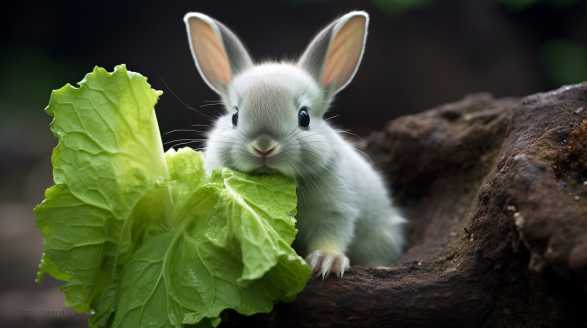
Can Rabbits Eat Napa Cabbage
Introduction Hey there, rabbit owners and enthusiasts! Are you constantly on the lookout for new ways to keep your fluffy pals happy and healthy? As someone who’s obsessed with their rabbits’ well-being, I’ve done my fair share of research into finding the best foods to keep them thriving. And, Napa cabbage is a game-changer! we’re […]
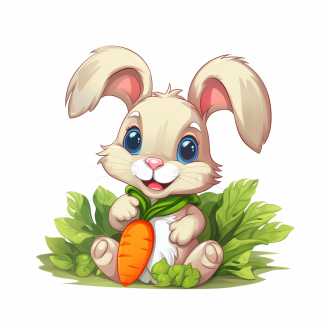
Rabbits Favorite Vegetables
Introduction As a devoted rabbit owner myself, I’ve witnessed firsthand the sheer joy and excitement that these fluffy creatures experience when sinking their teeth into their favorite veggies. And, it’s a sight to behold! Oh, the thrill of hearing that satisfying crunch as they nibble away! It’s like music to my ears. Sure, we all […]
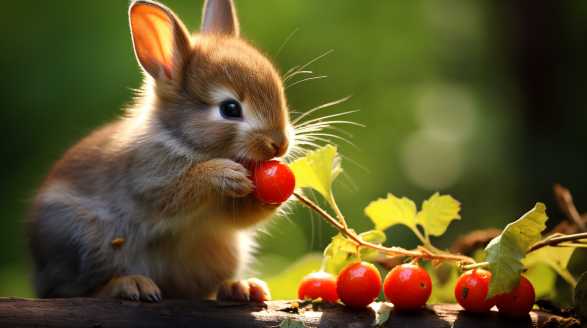
Can Rabbits Eat Cherry Tomatoes
Introduction Hey there, fellow rabbit enthusiasts! If you’re anything like me, you’re constantly thinking about how to provide the best care and nutrition for your furry friends. That’s where cherry tomatoes come in! These little bursts of flavor are not only delicious but also packed with nutrients that can benefit your rabbit’s health. That’s what […]
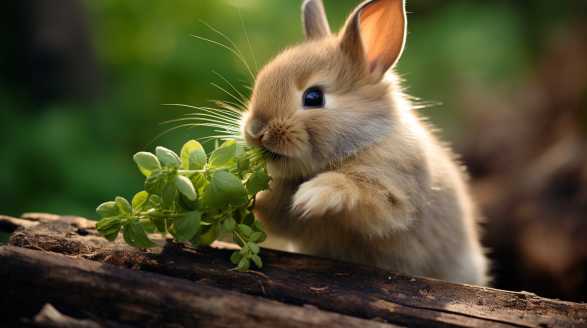
Can Rabbits Eat Oregano
Introduction Hey there, rabbit lovers! If you’re anything like me, you’re constantly on the lookout for ways to keep your furry friends healthy and happy. Oregano isn’t just a delicious herb we sprinkle on our pasta; it has some surprising advantages for our fluffy buddies too! we’ll cover everything you need to know about oregano […]
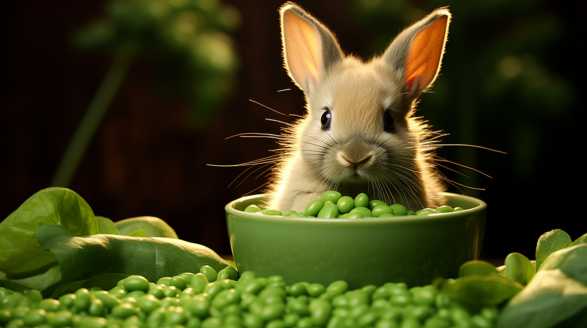
Can Rabbits Eat Peas
Introduction Hey there, fellow rabbit enthusiast! Have you ever considered adding peas to your furry friend’s diet? we’ll dive into the world of peas and explore why they should be a delightful addition to your bunny’s menu. Pea hay, derived from the foliage of the pea plant, is a fantastic option for rabbits. It contains […]
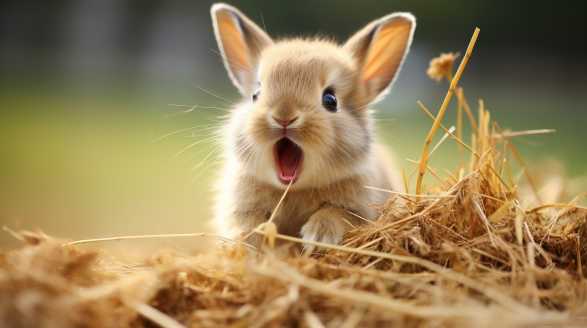
Oat Hay For Rabbits
Introduction Can Rabbits eat oat hay. Let’s find all about oat hay for rabbits. Trust me when I say, this is no ordinary hay. It’s like a treasure trove of benefits just waiting to be discovered! Picture this: fluffy bunnies, gleefully munching away on a deliciously nutritious snack that not only keeps their digestion in […]

